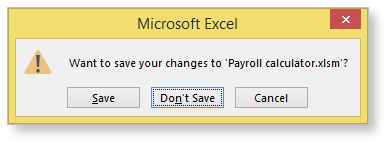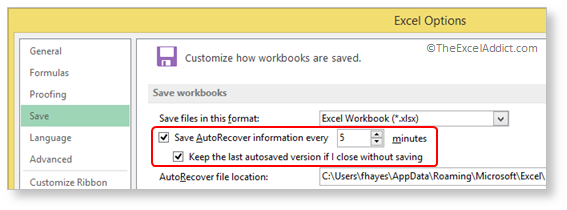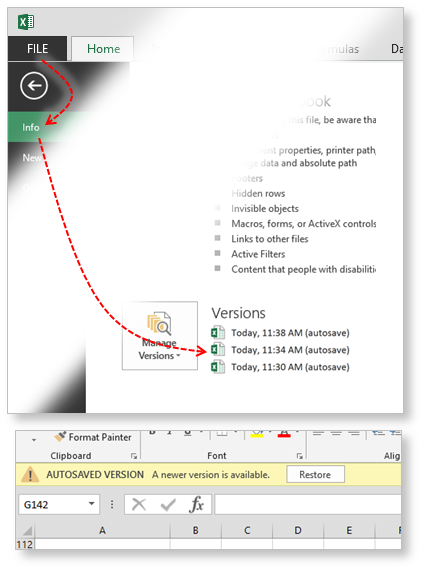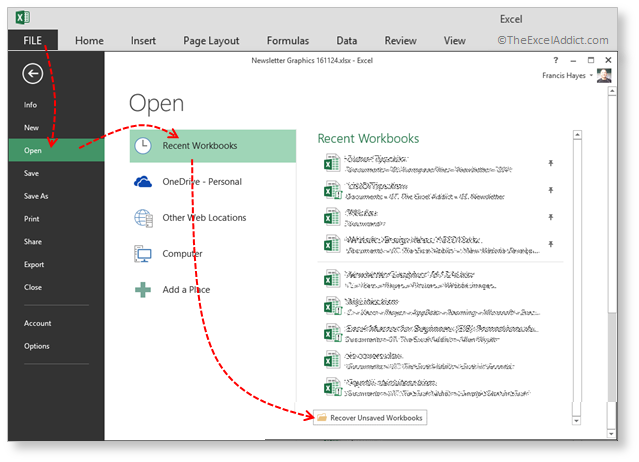How To Recover A Workbook You Forget To Save Changes To
How many times have you accidentally closed a workbook without saving changes and immediately realized your error? This may happen after you have made changes to an existing workbook or after you have been working on a new workbook and forget to save it.

With Excel 2007 and earlier versions, situations like these would leave you completely out of luck. If your computer crashed, however, there was a possibility that Excel would retrieve the last AutoSaved copy of workbooks that were open at the time of the crash and allow you to recover them from the AutoRecover pane. Though, my experience is that this was not always reliable.
Frequently saving multiple versions of your work is probably your best defense. Though I have to be honest with you, I don’t always practice what I preach, as I have a very poor habit of infrequently saving my work. But that doesn’t mean that you shouldn’t.
Recover Unsaved and Previous Versions of a Workbook
Starting with Excel 2010, a new a new feature called ‘Manage Versions’ was introduced (well. not really ‘introduced’ because very few Excel users have even heard about it). With ‘Manage Versions’, you have the ability to recover unsaved files as well as open earlier versions (i.e. a few minutes ago) of a file that you are currently working on.
To ensure that your versions feature is enabled, click File, Options, Save. Make sure that the that the ‘Save AutoRecover..minutes‘ and “Keep the last autosaved version…‘ settings are checked.

By default, Excel automatically saves a version of the workbook you are working on every 10 minutes. I have changed mine every 5 minutes.
Open an Autosaved Version of the Current Workbook
To open a recently autosaved version of the file you are currently working on, click File, Info and choose one of the versions listed. The autosaved workbook will open with a different name, thus allowing have two versions of the same workbook open.
You will see a message above the formula bar warning that this is not the latest version of the file (see image below). Do not click on Restore unless you want to replace the current version of your workbook with this previous autosaved version. If you DO need to work with both versions (current and previously autosaved) of a workbook, be very careful as both workbooks may look identical
and there is a risk that you may accidentally overwrite some of your recent work.

Once you save and close a workbook, all of its old autosaved versions are removed.
Opening a Previous Unsaved Version of a Workbook
If you close a workbook without saving changes, Excel deletes all versions of the file except for the last saved version and the most recent autosaved version. When you re-open the last saved version of a workbook that was last closed without saving it, you will have the option of opening that previous ‘unsaved’ version.
To open the previously ‘unsaved’ version of the current workbook, from the File menu click Info and click Manage Versions, Recover Unsaved Workbooks.
Unsaved Workbooks
To see all ‘unsaved workbooks’, from the File menu click Open, Recent Workbooks and then click Recover Unsaved Workbooks at the bottom of the screen.

Excel even saves a draft version of the new workbooks you create and work with but never save. These draft versions are kept for 4 days and after that, they are deleted.
Excel User’s Don’t Know What They Don’t Know
These recovery features can save Excel users a lot of work if they accidentally close a workbook without saving…but only if they know the option is available. Please share this tip with every Excel user you know because, chances are, they don’t know that this recovery feature is hiding right under their nose.





